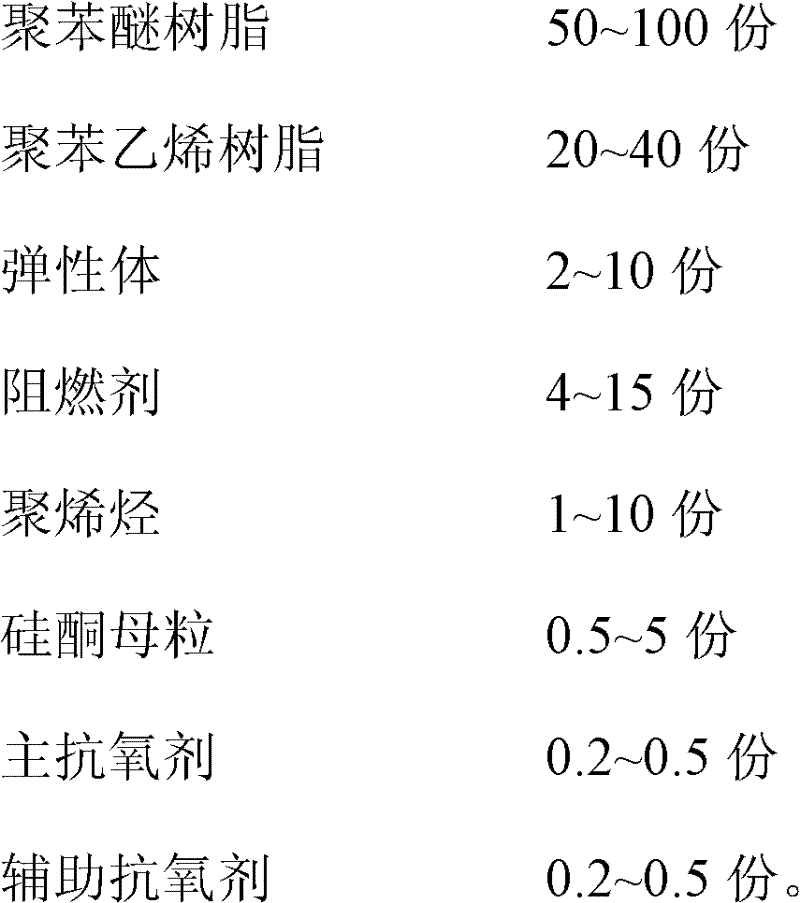Polyphenylene ether resin materials for processing charger housings
A technology of polyphenylene ether resin and polystyrene resin, which is applied in the field of polyphenylene ether resin materials, can solve problems such as indentation and scratches, achieve the effects of reducing pressure, improving surface lubrication, and solving indentation and scratches
- Summary
- Abstract
- Description
- Claims
- Application Information
AI Technical Summary
Problems solved by technology
Method used
Image
Examples
Embodiment 1
[0040] 75 parts of polyphenylene ether resin (PPE), 8 parts of hydrogenated styrene-butadiene-styrene (SEBS), 0.2 part of primary antioxidant and 0.2 part of auxiliary antioxidant are fed from the first weight loss type after high mixing 25 parts of polystyrene resin (PS) and 2.5 parts of linear low-density polyethylene (LDPE) are added from the second weight loss feeder after high mixing, and 10 parts of liquid flame retardant are fed from the liquid through a liquid pump It is added at the mouth, and then the twin-screw extruder is plasticized, melted, extruded, drawn, cooled, and pelletized. The pellets were dried in an air blast oven at 110°C for 2 hours, and then test specimens and products were prepared by injection molding machines. The main antioxidant is 3,5-di-tert-butyl-4-hydroxyphenyl propionate stearyl; the auxiliary antioxidant is tris(nonylphenyl)phosphite.
Embodiment 2
[0042] 75 parts of polyphenylene ether resin (PPE), 8 parts of hydrogenated styrene-butadiene-styrene (SEBS), 0.2 part of primary antioxidant and 0.2 part of auxiliary antioxidant are fed from the first weight loss type after high mixing 25 parts of polystyrene resin (PS) and 5 parts of linear low-density polyethylene (LDPE) are added from the second weight loss feeder after high mixing, and 10 parts of liquid flame retardant are fed from the liquid through a liquid pump It is added at the mouth, and then the twin-screw extruder is plasticized, melted, extruded, drawn, cooled, and pelletized. The pellets were dried in an air blast oven at 110°C for 2 hours, and then test specimens and products were prepared by injection molding machines. The main antioxidant is 3,5-di-tert-butyl-4-hydroxyphenyl propionate stearyl; the auxiliary antioxidant is tris(nonylphenyl)phosphite.
Embodiment 3
[0044] 75 parts of polyphenylene ether resin (PPE), 8 parts of hydrogenated styrene-butadiene-styrene (SEBS), 0.2 part of primary antioxidant and 0.2 part of auxiliary antioxidant are fed from the first weight loss type after high mixing 25 parts of polystyrene resin (PS) and 1 part of silicone masterbatch are added from the second weight loss feeder after high mixing, 10 parts of liquid flame retardant are added from the liquid feeding port through a liquid pump, and then Twin-screw extruder plasticizing, melting, extruding, drawing, cooling, pelletizing. The pellets were dried in an air blast oven at 110°C for 2 hours, and then test specimens and products were prepared by injection molding machines. The main antioxidant is 3,5-di-tert-butyl-4-hydroxyphenyl propionate stearyl; the auxiliary antioxidant is tris(nonylphenyl)phosphite. Silicone masterbatch is dimethyl silicone oil with low density polyethylene as the carrier.
PUM
 Login to View More
Login to View More Abstract
Description
Claims
Application Information
 Login to View More
Login to View More - R&D
- Intellectual Property
- Life Sciences
- Materials
- Tech Scout
- Unparalleled Data Quality
- Higher Quality Content
- 60% Fewer Hallucinations
Browse by: Latest US Patents, China's latest patents, Technical Efficacy Thesaurus, Application Domain, Technology Topic, Popular Technical Reports.
© 2025 PatSnap. All rights reserved.Legal|Privacy policy|Modern Slavery Act Transparency Statement|Sitemap|About US| Contact US: help@patsnap.com

